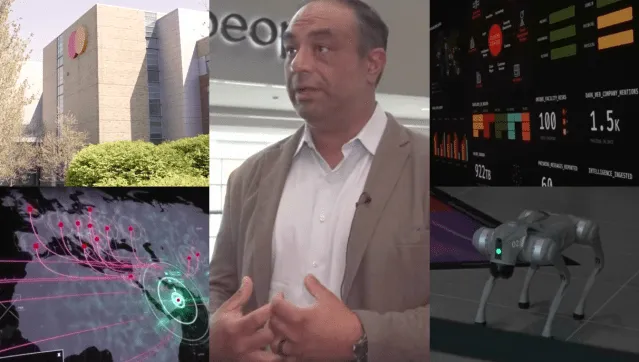O'FALLON, Mo. - Mastercard's St. Louis Tech Hub plays a major role in its worldwide operations, processing payments for 220 countries and handling 150 billion transactions annually.
The St. Louis Tech Hub, located in O'Fallon, Missouri, is one of seven global innovation centers responsible for operations, cybersecurity, research, and development that power Mastercard's global payment network.
Mastercard has had a growing presence in the St. Louis region since the 1970s, culminating with the opening of its massive campus in 2001, often considered the "heartbeat" of the company's core services and global operations.
In the present day, the St. Louis Tech Hub aims to ensure trust, transaction security, and fraud prevention while shaping the future of digital payments.
"This is the heart of where payments happen," said Chiro Aikat, Co-President of Mastercard's U.S. division. "It's [made possible by] the talent of St. Louis and the people in St. Louis. It's home for us. It's what helps drive and innovate us."
With thousands of employees working across a wide range of functions at any given time, Mastercard's St. Louis Tech Hub is a nonstop engine of global commerce. Last month, FOX 2 was invited for a behind-the-scenes look at three of its most important facilities: The Mission Control Center, the Fusion Center and the Makerspace Innovation Lab.
Mission Control Center
The Mission Control Center is considered a "nerve center" of Mastercard's global payment system, operating around-the-clock 24/7 and 365 days each year. Every transaction, whether it's a local lunch purchase or a cross-country order, flows through its systems.
For instance, if a customer in St. Louis makes a purchase from a website in San Francisco, it may seem like a standard, local transaction, but it's actually processed through Mastercard's global payment network operating seamlessly behind the scenes.
Mission Control teams in St. Louis monitor the speed, health, and security of these transactions in real time. They also analyze fraud patterns, manage system uptime, and reroute activity instantly if disruptions occur anywhere around the world.
"It's like NASA," said Aikat. "You'll see all the transactions. We connect the payments ecosystem globally."
"We connect millions and millions of merchants all around the world to millions and millions of cardholders who have had payment credentials issued by multiple financial institutions across the globe. We connect them together in here."
Fusion Center
The Fusion Center is considered Mastercard's cybersecurity command post, modeled after top government and law enforcement practices.
Teams analyze real-time data to detect, stop, and even predict cyberattacks that may appear across the payments ecosystem, not just within Mastercard's own network.
Using advanced tools like encryption, tokenization, phishing detection, and predictive analysis, Fusion Center staff can pinpoint vulnerabilities and take proactive measures to neutralize threats before they impact consumers or businesses.
Mastercard estimates the Fusion Center has helped prevent more than $50 billion in global fraud losses over the past three years, making it a cornerstone of consumer protection.
"If we didn't have this fusion center here, if we didn't have the network and technology to look at costs, it would drive [costs] to the U.S. consumer," said Aikat. "So the technology and the people in St. Louis sitting here are protecting the consumers, day in and day out, from all the cyber threats."
Innovation Lab
The SafetyNet & Maskerspace Innovation Lab is a collaborative space where Mastercard teams test new technologies and explore the future of digital payments. It's both a think tank and testbed, dedicated to advancing security and improving trust globally.
The SafetyNet cloud platform, which acts as a global fraud defense shield, is capable of detecting and shutting down fraud attempts at any scale. It operates in tandem with Makerspace, an innovation lab where employees develop cutting-edge technologies that help with addressing threats.
"We can detect it. We can stop it. We can shut it down and we can prevent the fraudster from going somewhere else," said Aikat.
The lab also supports the exploration of new tools and interfaces to enhance customer experiences. It's equipped with advanced tools like 3D printers, GPU towers, soldering stations, VR headsets, and even robotic dogs that demonstrate emerging tech applications. Mastercard says various technologies like tap-to-pay and mobile transactions have also been developed and refined in St. Louis.
"We are increasing technologies over there, so not just fraud, but what is the next consumer behavior pattern that we need to think about make it easy [for consumers]? All that technology, all that trust, happens in the space where employees get together."
What else to know
Mastercard's St. Louis Tech Hub is more than just a tech campus. The company works closely with local institutions like Washington University and LaunchCode to develop talent and grow the regional innovation economy.
This year, for example, Mastercard will host around 50 interns in St. Louis to build upon broader engineering, product, and technology roles.
Meanwhile, the company donated more than 32,000 volunteer hours last year to support financial literacy, entrepreneurship, and STEM education in local communities.
While operations run continuously, two of the busiest days on Mastercard's calendar year are Super Bowl Sunday and Black Friday, when transaction volumes surge worldwide. Those peak moments highlight the critical role that the St. Louis Tech Hub plays in ensuring smooth and secure payment experiences for millions of consumers and businesses alike.
"The best of the minds to come and learn about the business and help us grow and innovate," said Aikat. "So for us, it's not just about empowering economies and empowering people, but it's also about contributing to the community that we are so closely."
